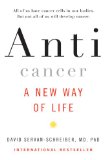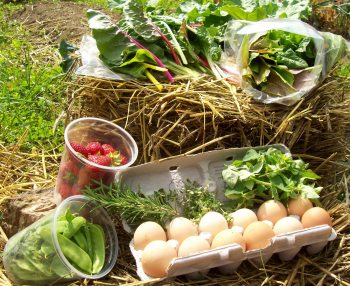
Food and Health, Part 2
 David Servan-Schreiber was a medical
researcher in his early thirties when he learned he had brain cancer.
After surgery, he searched for a way of life which would reduce his
chances of his cancer recurring. His book, Anticancer: A New Way of Life,
tells what he learned, scientifically, about how diet affects
cancer.
David Servan-Schreiber was a medical
researcher in his early thirties when he learned he had brain cancer.
After surgery, he searched for a way of life which would reduce his
chances of his cancer recurring. His book, Anticancer: A New Way of Life,
tells what he learned, scientifically, about how diet affects
cancer.
Dr. Servan-Schreiber's
experience with cancer changed him from a research career-driven
scientist to one interested in the practical application of science,
particularly the drawing together of divergent knowledge to find out
what prevents cancer and, once it has been treated, what prevents it
from recurring. He learned that healthy immune cells fight cancer in
its beginning, so it doesn't take over a body.
 “...studies on the activities of immune
cells...show they are at their best when our diets are healthy, our
environment is 'clean,' and our physical activity involves the entire
body (not just our brains and our hands)."
“...studies on the activities of immune
cells...show they are at their best when our diets are healthy, our
environment is 'clean,' and our physical activity involves the entire
body (not just our brains and our hands)."
What inhibits immune
cells? Traditional western diet. Persistent anger or despair. Social
isolation. Denial of one's true identity (that is, trying to be what
we're not). Sedentary lifestyle.
What activates immune
cells? Mediterranean diet, Indian cuisine, Asian cuisine. Serenity,
joy. Support from family and friends. Acceptance of self with one's
values and past history. Regular physical activity.
Here, in a nutshell, is
the formula for living a long and healthy life. If only it were so
easy. It has taken me almost fifty years to change from a meat and
potatoes (preferably fried) diet to a better one. And I'm not there
yet. Change comes slowly, but it does come.
|
Corn (canned) Canned corn had only one pesticide residue (diazinon) in thirty six samples. Corn (fresh/frozen, boiled) Two residues of the pesticide diazinon and one of chloroform were detected in thirty-six samples of fresh corn, an extremely safe food, from the pesticide standpoint, although society's overreliance upon corn for corn oil and other process products has led to an overabundance of proinflammatory omega-6 fatty acids in our diet. These fatty acids are linked with heart disease and arthritis. --Diet for a Poisoned Planet, David Steinman,, Thunder's Mouth Press, 2007 |
This post is part of our Food and Health lunchtime series.
Read all of the entries:
|
Want more in-depth information? Browse through our books.
Or explore more posts by date or by subject.
About us: Anna Hess and Mark Hamilton spent over a decade living self-sufficiently in the mountains of Virginia before moving north to start over from scratch in the foothills of Ohio. They've experimented with permaculture, no-till gardening, trailersteading, home-based microbusinesses and much more, writing about their adventures in both blogs and books.
Want to be notified when new comments are posted on this page? Click on the RSS button after you add a comment to subscribe to the comment feed, or simply check the box beside "email replies to me" while writing your comment.
- Remove comment
- Remove comment
